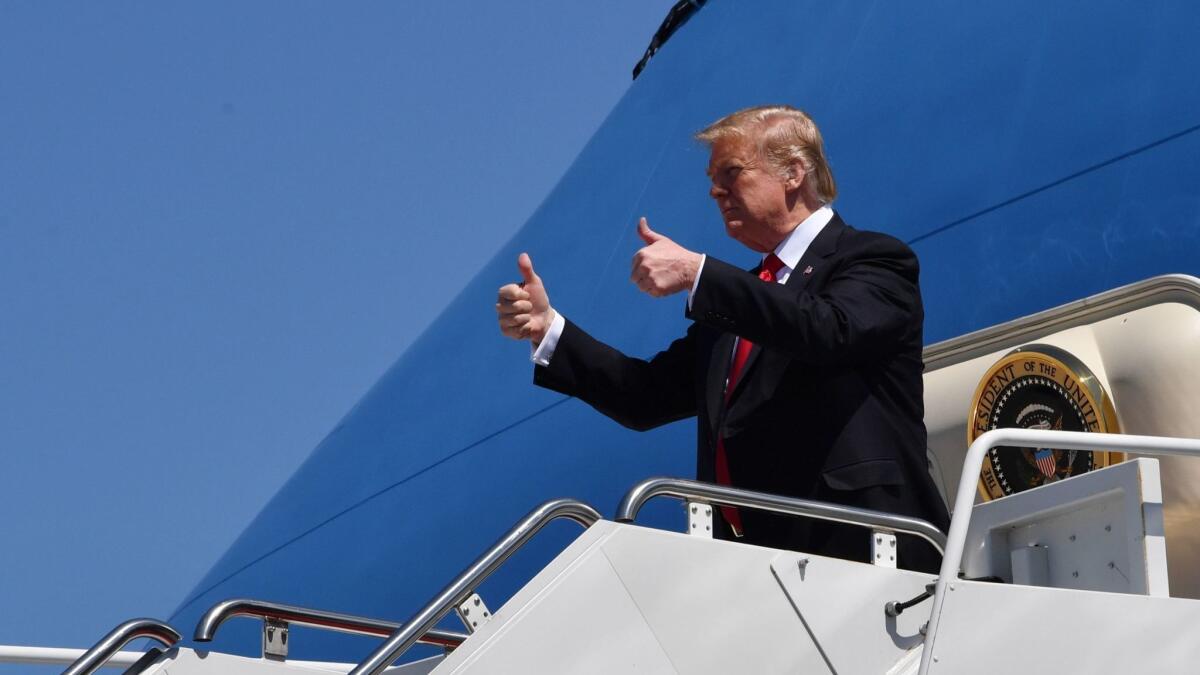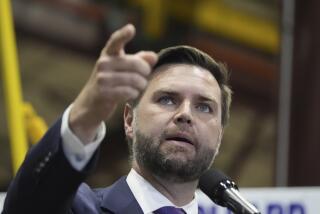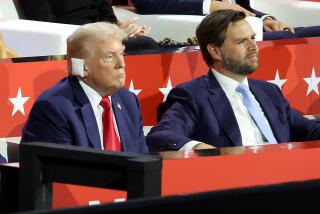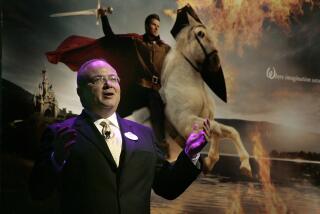Trump’s next Federal Reserve nominee: campaign advisor and Fed critic Stephen Moore

Reporting from Washington — President Trump said Friday that he planned to nominate Stephen Moore, a conservative economist and commentator who served as a Trump campaign advisor, to a seat on the Federal Reserve board.
Moore, who has been a prominent critic of the Fed, would fill one of two vacancies on the central bank’s seven-member Board of Governors. Trump confirmed reports of the nomination when he talked to reporters after arriving on Air Force One in Palm Beach, Fla.
Moore is a visiting fellow at the Heritage Foundation, a conservative think tank, and was a senior economic advisor to Trump’s 2016 campaign. He also has been an analyst on Fox News and more recently CNN.
“He’s going to be great on the Fed,” Trump said.
Moore did not immediately return a phone message requesting comment.
Moore co-wrote an opinion article in the Wall Street Journal last week titled “The Fed Is a Threat to Growth,” which blamed recent interest rate hikes by the central bank for slowing U.S. economic growth and causing “wild swings in the stock market.”
The criticism echoed Trump’s unprecedented public pressure campaign on Fed Chairman Jerome H. Powell to stop slowly increasing a key interest rate.
“Moore’s direct criticism of Powell surely scored points with Trump,” said Capital Alpha Partners, a Washington strategic research firm, in a report Friday.
Moore has been an outspoken supporter of the Trump administration’s economic agenda, including the large tax cuts that took effect last year, and he’s an advocate of supply-side economics, which argues that lower tax rates end up increasing government revenue because they spur growth.
Last year, Moore co-wrote a book with prominent supply-side economist Arthur Laffer called “Trumponomics: Inside the America First Plan to Revive Our Economy.”
Those views are likely to trigger strong Democratic opposition in the Republican-controlled Senate.
Fed board members serve 14-year terms and their nominations must be confirmed by the Senate, although because of retirements Moore would fill the remainder of an open seat with a shorter term. One expires in 2024, the other in 2030.
“We foresee pushback by Democrats, if for no other reason than Moore is a Trump supporter,” Capital Alpha partners said in its research report. “But Moore should be able to win Senate confirmation, even if it’s a close party-line vote.”
Trump has nominated four of the five board members, including Powell, who was already serving when Trump was elected but then was tapped to replace Janet L. Yellen as chairman. Monetary policy decisions are made by a special 12-person Fed committee that includes the seven board members and five regional Fed bank presidents.
Moore has a master’s degree in economics from George Mason University in Virginia, although most high-level economists have doctorates. He has served as a senior economist on Congress’ Joint Economic Committee and was a senior economist at the Cato Institute, a libertarian think tank.
In 1999, Moore founded the Club for Growth, a free-market advocacy group that tries to help elect conservatives to Congress. He has called the founding of the organization, which he headed until 2004, the defining moment of his career.
Powell, whom Trump picked to lead the Fed, and his colleagues on the central bank’s monetary policy committee have said they will be patient with future interest rate hikes this year after increasing the rate by one percentage point in 2019.
The benchmark federal funds rate, which now is at a range between 2.25% and 2.5%, remains historically low. But it is well above the unprecedented near-zero level the Fed kept it at for seven years starting in 2008 in an effort to stimulate the economy during and after the Great Recession.
Powell has said Trump’s comments had nothing to do with the rate hike pause, which was based on slower economic growth here and abroad.
More to Read
Inside the business of entertainment
The Wide Shot brings you news, analysis and insights on everything from streaming wars to production — and what it all means for the future.
You may occasionally receive promotional content from the Los Angeles Times.











